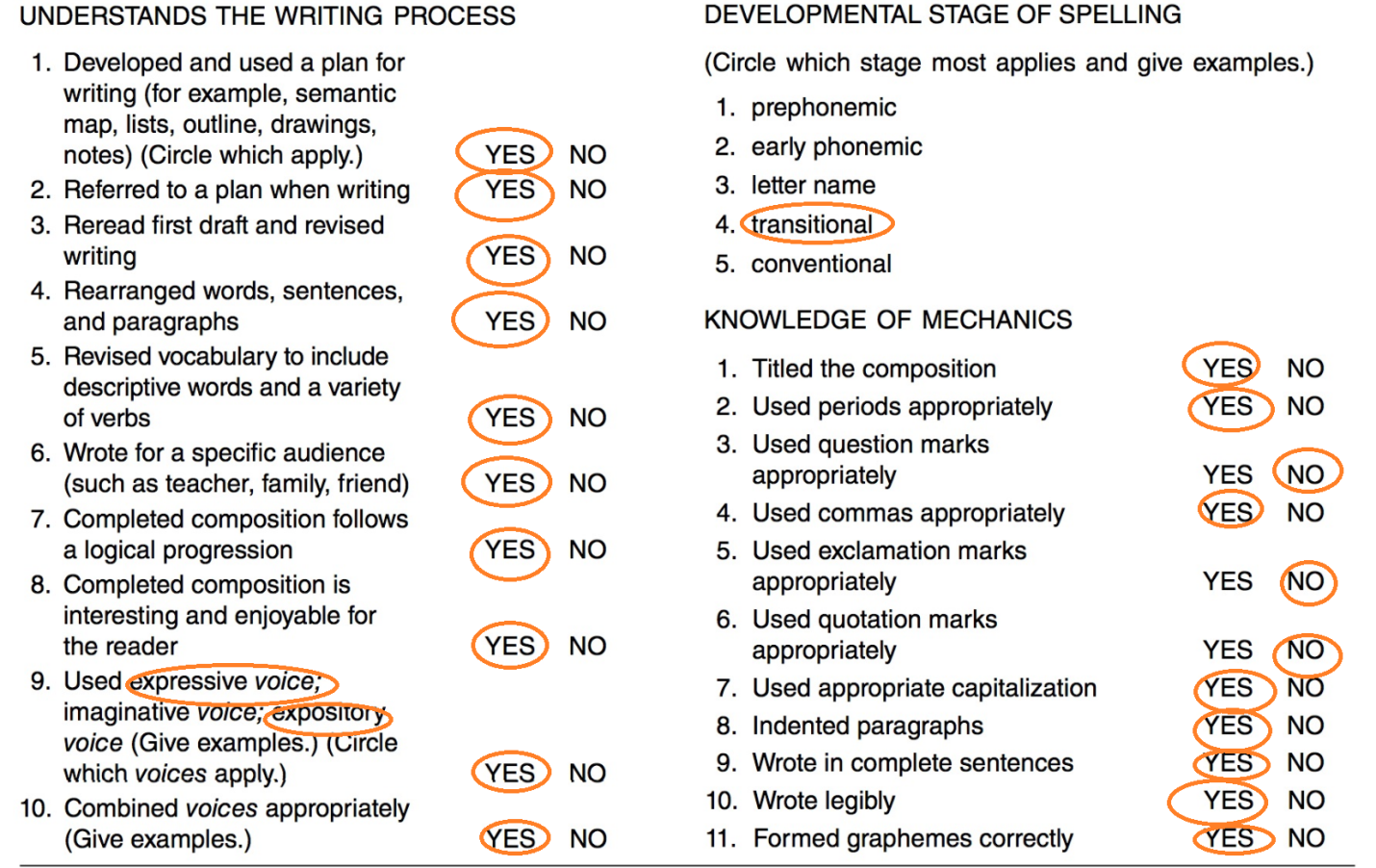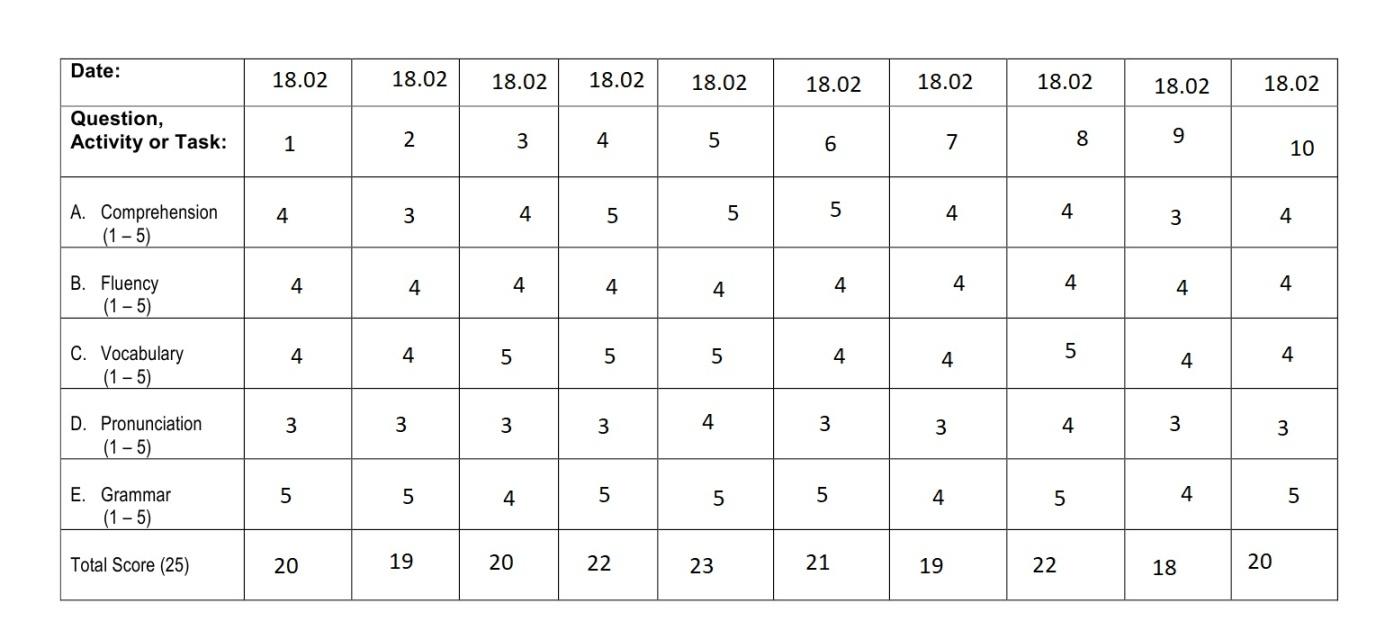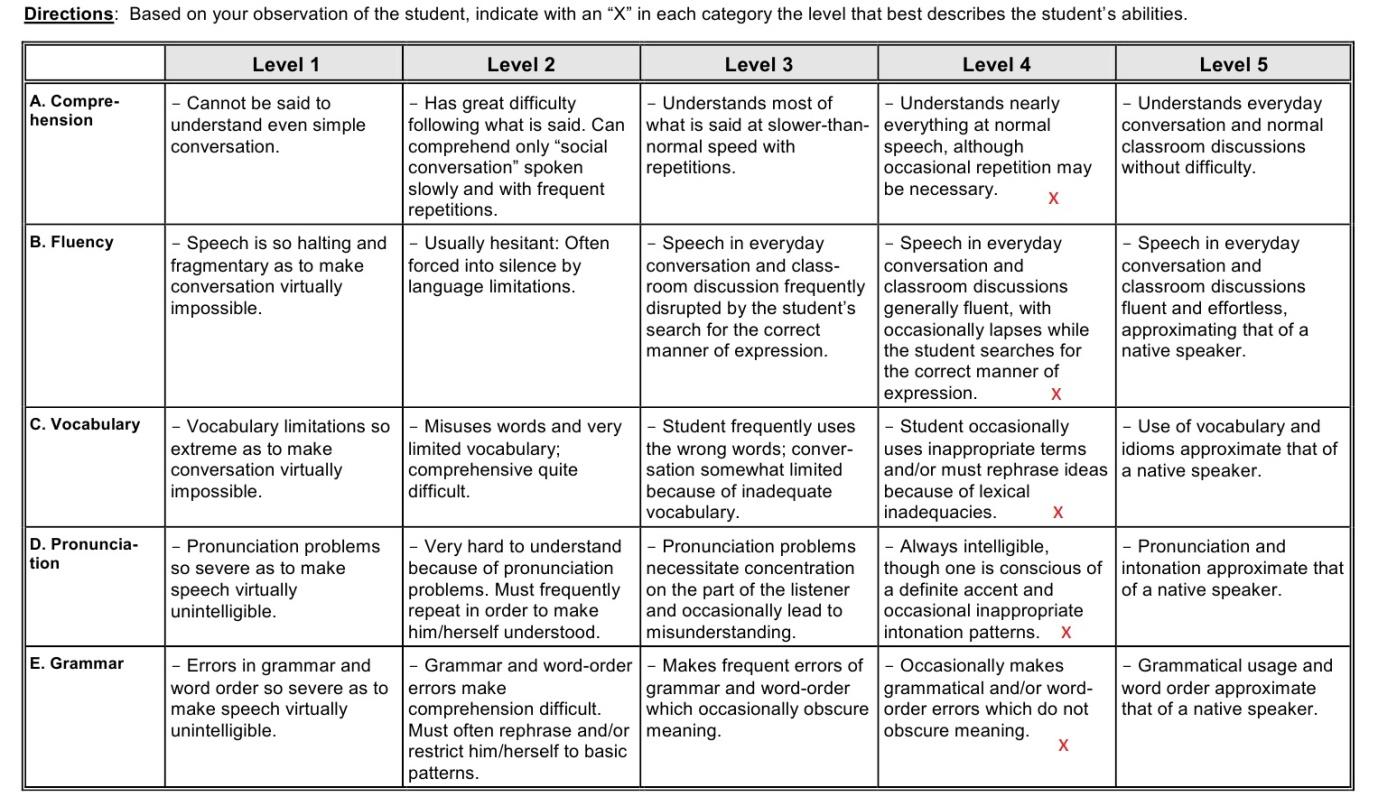Introduction
The case study student is Alexander (Alex), a 10-year old boy who has difficulties in musical, interpersonal, and, most importantly, verbal-linguistic behaviors. The student cannot express himself verbally well, and he does not enjoy reading and writing, too. It would be incorrect to state that Alex has any serious difficulties in communication: his shyness and rich imagination shift his focus from others to self. Alex enjoys taking part in activities that require movement, action, i.e., tasks that imply bodily-kinesthetic learning style. Alex also enjoys drawing and playing with animals. His scores in all multiple intelligence areas can be found below (see Figure 1):
Figure 1. Alex’s scores.
Alex’s reading ability is not very well-developed as he does not enjoy reading and often pays little attention to it during class. He can confuse or mispronounce words when reading and cannot read quickly. His writing abilities are better than reading skills, but he still makes mistakes in some words that are less frequently used or that he has not encountered very often. Overall, Alex is capable of producing a well-structured text with minor mistakes (see Figure 2):

When previous assessments were conducted, the author suggested that Alex needed to improve his academic writing by using analytical skills to provide a more coherent text with fewer mistakes. Alex’s creative approach to writing was marked as an advantage that could positively affect his writing.
An important factor that has to be considered is that Alex does not have any medical conditions that could affect his ability to learn; his traits such as shyness and the love of daydreaming affect his performance. Although his parents frequently try to engage him in conversations, he does not always find them interesting or can pay little attention to them because of his focus on something else.
Assessment Results
The most informative assessments provided to the student were multiple intelligences testing and inventory of interests, as well as oral language summary profile and SOLOM testing. These assessments were chosen because they provide measurable outcomes, judging by which it is possible to understand in what specific areas Alexander experiences difficulties. Each of the assessments selected can assist the teacher in determining what students’ needs might be.
Alex’s results in multiple intelligences testing were provided above (see Figure 1). Visual-spatial, bodily-kinesthetic, intrapersonal, and naturalist areas are among the most developed ones. His learning style could be described as bodily-kinesthetic or visual-spatial. The results of the inventory of interests indicate that Alex is interested in drawing, moving, as well as such subjects as biology and science. The oral language summary profile demonstrated that the student had difficulties with pronunciation, although he had good scores in fluency and vocabulary. The exact results can be seen in Figure 3:

At last, his results in SOLOM testing (demonstrated in Figure 4) were satisfactory, although not as expected from a native English speaker (native speakers are expected to score 5 in all categories):

It is crucial both for the teacher and the reader to keep in mind that since Alex is a shy child, his scores in various tests can be affected by his anxiety. Although the tests demonstrated in this paper had been conducted by Alex’s favorite teacher, he was still nervous about them and their results. Alex’s difficulties in fluency, comprehension, vocabulary, and other areas can mostly be explained by the fact that he rarely takes part in conversations and read-aloud, which sometimes leads to improper use of idioms and incorrect pronunciation or misunderstanding of what had been said to him.
Assessment Analysis
First, multiple intelligences testing results will be analyzed. As it was discussed previously, Alex’s results indicate that his learning style is best described as bodily-kinesthetic or visual-spatial. These results (namely, the visual-spatial learning style) imply that Alex would benefit from instructions that utilize pictures, graphs, as well as art projects and video lectures that help the student visualize the task and reference points in it to each other. Also, Alex should be allowed to use drawing and sketching as tools for learning. To support Alex’s bodily-kinesthetic learning style, the teacher can include games and other similar physical activities (such as role-playing, for example) to the instructions. As students with bodily-kinesthetic learning styles frequently use movements for self-expression and to explain or understand instructions, teachers should use such activities more often to ensure that the needs of such students are met. As an example, one could provide students with practice materials that children can use to understand the subject in practice (e.g., models of human or animal bodies for biology classes, role-playing for literature classes, etc.). It should be noted that such tools as 3-D models and graphs or charts are highly useful to students with bodily-kinesthetic and visual-spatial learning styles, and are therefore very beneficial in classrooms, for Alex in particular. Alex also scored high in the naturalistic area, which is why he will find such tasks as data analysis, observation of animals, and plants exciting. Structuring his materials in the form of a small system could also be useful.
Alex’s pronunciation difficulties are related to his little interest in reading, but since he is not an ESL student, he will need exercises that will help him learn how to pronounce words used and seen less frequently than others. The teacher can use cards with words written on them to teach Alex to pronounce complex words and phrases correctly. Furthermore, Alex will need to read more frequently, and in this case, he can benefit from reading together with a teacher. Some books that contain complex words, such as workbooks and science books for K-5 students can be utilized efficiently in this case. Additional exercises that are both fun and challenging are tongue twisters, which both support student’s ability to read and pronounce words correctly. Alex needs to train his pronunciation skills together with the teacher and by himself; such training will include both silent reading and read-aloud, which can complement Alex’s reading skills as well.
The SOLOM results, as demonstrated above, show that Alex’s skills in each category (comprehension, fluency, vocabulary, pronunciation, and grammar) are at the fourth level, which is not approximate that of a native speaker. Thus, Alex needs training in all those areas, with a particular emphasis on pronunciation and comprehension. To develop these skills, Alex will need to complete tasks and exercises both together with the teacher or classmates during lessons or at home. To train grammar and vocabulary, the student has to engage in writing and reading activities, such as journal keeping, book review, etc. A more detailed overview of the activities that will correspond to the needs of the student is presented in the next section.
Assessment Plan
The plan is based on the identified issues and will cover each of the strengths and needs. Additional suggestions (such as proposed exercises, tasks, and activities) are also included in the plan.
Learning Styles
The identified learning styles are visual-spatial, bodily-kinesthetic, and naturalistic. The following tasks are going to be highly beneficial:
- Use visual instructions (schemes, graphs, photos, and pictures) to teach any subject. Present rules using flashcards. Demonstrate how the rules are used with visual cues (e.g., write prompts for maths classes, such as 1/100=0.01, etc.)
- Ask the student to draw small, simple maps, charts, or instructions right in the notebook. During history classes, provide students with prints of countries, plans of movements across battlefields, etc.
- Partner the student with other kinesthetic learners (Vaishnav & Chirayu, 2013). This way, Alex will have the opportunity to connect with others as well, thus improving his communication skills
- Make the student study in short blocks. Kinesthetic students cannot concentrate for long periods. Divide the lesson into several parts and ensure that there is a room for short breaks (Vaishnav & Chirayu, 2013)
- Support Alex’s naturalistic learning style by introducing him to the school lab. Ask him to record experiments, start a learning journal, discuss outcomes of experiments with a teacher. Encourage data analysis (Kolb, 2014)
Pronunciation Issues
As Alexander is a native speaker, exercises that were developed for non-native speakers should not be used actively, but some can be useful:
- Mechanical production. The student repeats words and phrases after the teacher (Tergujeff, 2013). Complex words or words tied to a particular subject can be used in this case.
- Engage the student in discussions. Ask Alex to participate in discussions of books and texts where complex vocabulary is used. This way, the student will have the chance to use the words in context and practice their pronunciation.
- Recording. The recording is mostly used for ESL students but can be useful in the present case study as well. The teacher should record Alex’s read-aloud of various texts and then replay the record. This activity will help Alex learn what mistakes he makes and how he can avoid them.
SOLOM
To improve his score and ensure that all his abilities are at the fifth level, Alex will need to read and write more frequently, especially in his free time.
- To improve student’s reading levels, the teacher can use the DEAR activity (Drop Everything and Read). When it is DEAR time, all students and the teacher in the class stop doing what they were doing and read (Reading Rockets, n.d.)
- To improve student’s writing levels, dictations are an option The teacher dictates various words, phrases, and/or sentences and students write them down. The teacher can provide the text to students for self-check or check the work him/herself.
- Engage parents. Talking with parents can improve Alex’s fluency, vocabulary, and comprehension. He should discuss various themes with them, including more complex ones such as science and the news (local or global).
- Journal keeping can improve Alex’s writing (grammar) as well. The teacher can ask Alex to keep a diary where he will record his daily activities and expressions. Additionally, Alex can also start a journal about his lessons and write down what he has learned, what he liked or did not like about the experience.
Conclusion
Pronunciation, reading, and partially writing are areas that teachers should develop in Alex. To improve Alex’s skills, read-aloud, journals, discussions with parents, repletion, and other activities are suggested. The lessons in the classroom should be adapted to his learning styles (visual-spatial and bodily-kinesthetic) and can include role-playing, drawing, and scientific experiments in the school lab.
References
Gipe, J. P. (2014). Multiple paths to literacy: Assessment and differentiated instruction for diverse learners, K-12. London, England: Pearson Higher Ed.
Kolb, D. A. (2014). Experiential learning: Experience as the source of learning and development. Upper Saddle River, NJ: FT Press.
Reading Rockets. (n.d.).D.E.A.R. day, April 12th. Web.
Tergujeff, E. (2013). Learner perspective on English pronunciation teaching in an EFL Context. Research in Language, 11(1), 81-95.
Vaishnav, R. S., & Chirayu, K. C. (2013). Learning style and academic achievement of secondary school students. Voice of Research, 1(4), 1-4.